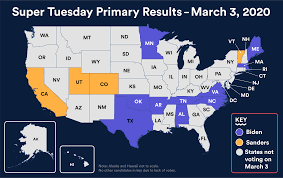
By: Jack Sorenson | Head Editor
March 6, 2020
March 3, 2020, marked this year’s edition of one of the biggest events in American politics: Super Tuesday. While states like Iowa and New Hampshire garner attention for holding their elections earlier on than the rest of the country, Super Tuesday sees 1,357 of the 3,979 delegates decided for candidates. 1,991 delegates are needed to win the Democratic nomination for President. This year, 14 states participated in Super Tuesday voting, the two largest being California and Texas.
Many campaigns have been made or broken by Super Tuesday. This cycle, former Vice President Joe Biden’s bid leapfrogged its way to the front of the Democratic nomination. Vermont Senator Bernie Sanders had won (either by delegate count or popular vote) the first three states to vote: Iowa, New Hampshire, and Nevada. Biden then pulled out a landslide victory in South Carolina, where the African American vote is a much larger portion of the franchise than in any of the previous states.
Following the win in South Carolina and a slew of high-profile endorsements— including former candidates Amy Klobuchar and Pete Buttigieg— Biden was able to win 10 states and 573 delegates (as of March 5, not all delegates have been allotted). Senator Sanders was only able to win in his home state of Vermont, California, Utah, and Colorado.
“I think even though Bernie is really popular right now, Biden probably has wider support across the country,” San Clemente High School senior JJ Peters said.
One of the Biden campaign’s main claims is that the former Vice President is more electable than Sanders, whose lofty ideas and proposed programs have ostracized him from much of the moderate Democratic base. With the win on Tuesday, many feel that claim of being the more electable candidate has been greatly strengthened or even solidified.

The Democratic Primaries were not the only thing on the ballot this Tuesday, however. In Orange County, both of the proposed municipal bonds intended to provide funding for educational facilities failed to pass.
“It’s a bummer that they couldn’t pass the bond,” SCHS senior Trey Benedict said. “Some of the stuff they were going to do looked really cool.”
Measures I and H were both defeated by significant percentage points. Consequently, none of the proposed modifications and additions to San Clemente High School will have sufficient funding to be completed in the coming years. Additionally, in a preview for the November race between Mike Levin and Brian Maryott, Levin received 54% of the primary vote. Despite the lead, the 49th District Congressional seat is expected to experience fierce competition in the lead up to November.
Regardless of political standing or opinions, if you are able to vote next election in November, be sure to get out and make your voice heard.

Leave a Reply